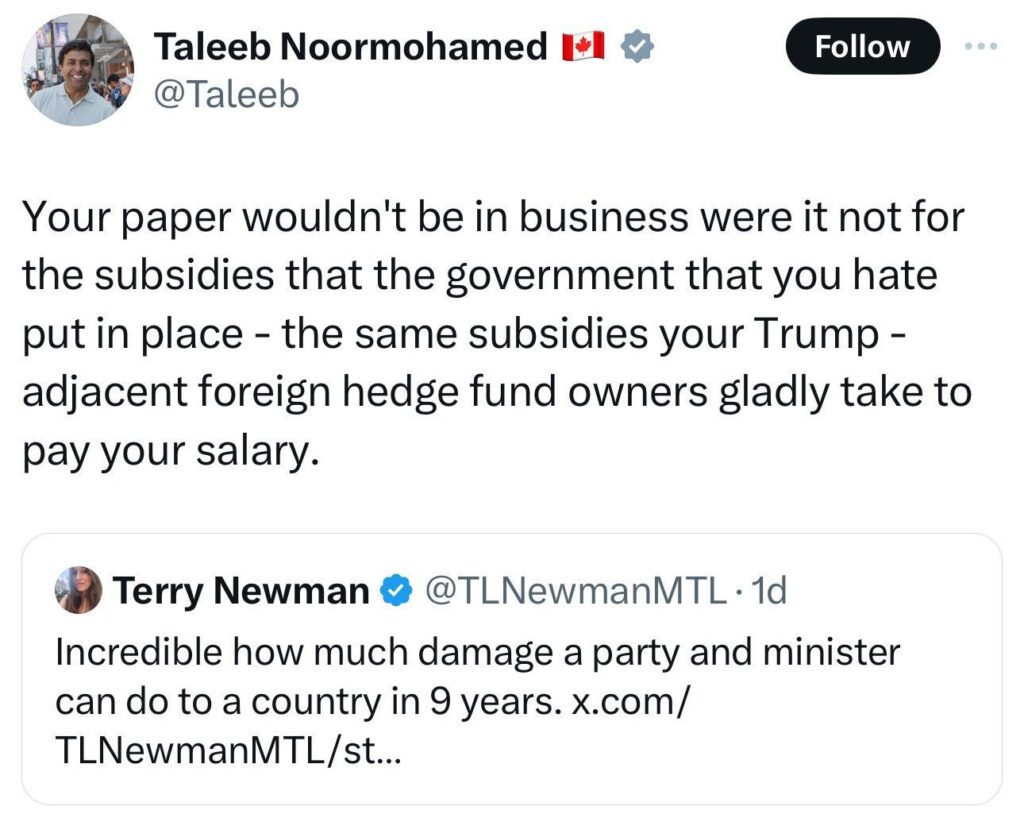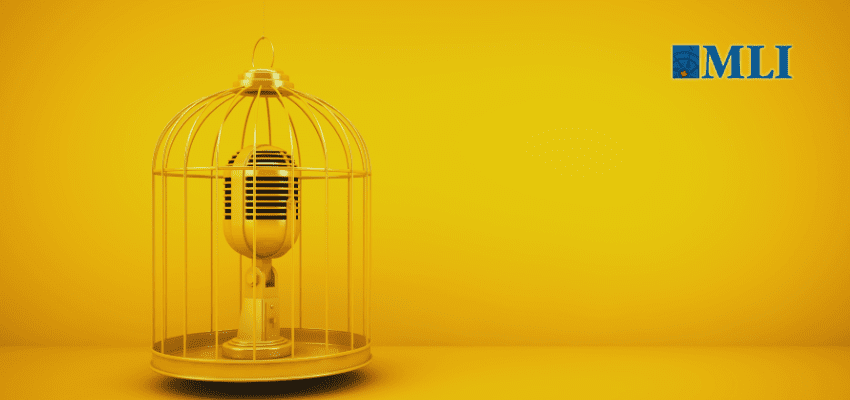This article originally appeared in the Line.
By Peter Menzies, September 12, 2024

Taleeb Noormohamed did a bad thing the other day and everyone who cares about an independent free press should be glad of it.
The Liberal MP for Vancouver Granville — Jody Wilson-Raybould’s old riding — is clearly an intelligent man with much to offer. His resume boasts degrees from Princeton, Harvard and Oxford and, prior to his election in 2021, he had worked within government, for the 2010 Olympics, and in senior roles for a number of tech companies. He was also apparently pretty good at buying and selling property.
But if the polls don’t turn around in the next year and a bit, he’s very much at risk of being unemployed and unqualified for a pension or, perhaps worse, a nobody wasting the most productive career years of his life as an Opposition MP.
So, there’s a good chance he was frustrated when he read an X-post by Terry Newman, National Post’s new senior editor of its Comment section, promoting a column she had written outlining the incredible damage “a party and a minister can do to a country in nine years.”
Noormohamed responded bitterly, reminding Newman to whom her employer owes its existence:
“Your paper wouldn’t be in business were it not for the subsidies that the government that you hate put in place — the same subsidies your Trump-adjacent foreign hedge fund owners gladly take to pay your salary,” he wrote.
Unable to resist such low hanging fruit, I then suggested Noormohamed was reminding Newman “who her daddy is.” He responded to me that all he had done was state facts, the “US hedgies” would quickly shut down the Post “without those subsidies” and “tell me I’m wrong.”
I could not.
Nothing Noormohamed said was untrue. He and I are in perfect alignment in the view that were it not for the patronage of the Justin Trudeau government, Postmedia (and likely the Toronto Star) would by now have ceased to exist. Some of its titles may have sold for parts, but most of its zombie products would have been dispatched long ago with a bankruptcy bullet to the brain, allowing new media to spring forth from decay.
About that, he was not wrong, even though what he did was very inappropriate, even more so because Noormohamed is not just some schmuck MP making up the numbers in a minority Parliament. He’s Parliamentary Secretary to the Minister of Heritage, Pascal St-Onge, in whose office most of the decisions regarding the plethora of funding arrangements for Canadian news media are made.
For the record, those include the $100 million Google fund via the Online News Act, the $20 million Local News Initiative, the $75 million Canada Periodical fund, its additional $13 million “special measures” portion and the Journalism Labour tax credit — announced as $119 million annually for five years only in 2019 but now doubled in size and extended, probably until forever. St-Onge and Noormohamed’s ministry also oversees the panel that decides what news organizations qualify for loot; further, the Canadian /Radio-television and Telecommunications Commission (CRTC), which will provide about $60 million through its Independent Local News Fund, reports to Parliament through them. It has also just opened a process for additional local news funding and next year will be holding the Mother Of All Hearings into the state of the nation’s journalism and what sort of additional funding mechanism it can cook up through that.
In other words, Noormohamed holds the media’s ass in his hands. Add up the above, and we’re looking at about half a billion bucks a year.
That’s why, as inappropriate and blatantly intimidating as it was for him to write what he wrote, those who care about maintaining a media industry free from government influence should be glad he said the quiet part out loud. This is what his colleagues must be thinking, and will be reminding journalists of in the year ahead.
We are no longer talking here about nip and tuck federal funding to cover The Hockey News’s postal costs, or to ensure service to francophones in Saskatchewan. The amount of government support for Canadian news organizations has grown over the past five years to the point where for most it is now of existential value. Without it, as Noormohamed discerned, Newman, her colleagues and a great many other journalists could be out on the street, the mortgage unpaid, the kids unfed.
Coincidentally, Noormohamed, most of his colleagues, and all the political staff at Heritage and other ministries are no doubt wondering why they are paying Newman et al. to ruin their lives.
Newman put on a brave face and sarcastically posted in response: “OK, you win. You pay my salary. I’ll stop criticizing your government now. Please don’t fire me.”
Her boss, Carson Jerema, stuck up for her in similar fashion and Richard Warnica, opinions editor at the Toronto Star, expressed his concern, by posting:
“I am a huge advocate for publicly supported journalism, have been for many, many years. I cannot think of anything that would more effectively undermine that idea than a government MP tweeting (what Noormohamed said.)”
Noormohamed did exactly what freedom of the press advocates predicted politicians would do — the very same thing that those self-interested funding recipients denied was possible: put the squeeze on.
Conservative Deputy Leader Melissa Lantsman weighed in, as did some of the usual suspects on the right — the National Citizens Coalition and Spencer Fernando, for example. But other than a few retired journos and the increasingly rare voices of those in the business who reject government funding and find the idea of being wards of the state abominable, there was nothing to indicate the news industry was either shocked or appalled by the Parliamentary Secretary for Canadian Heritage’s rhetorical thuggery.
It was almost as if his only sin was speaking of that which those involved had agreed should never be spoken, at least not in front of the children.
Noormohamed’s message was sent and his X-post still stands, unrepentant, unredeemed and, I’m guessing, understood.
Peter Menzies is a senior fellow with the Macdonald-Laurier Institute, a former publisher of the Calgary Herald and a previous vice-chair of the Canadian Radio-television and Telecommunications Commission (CRTC).






